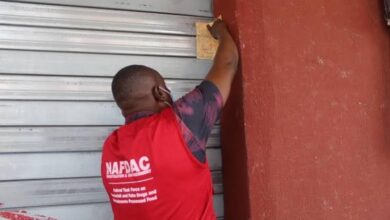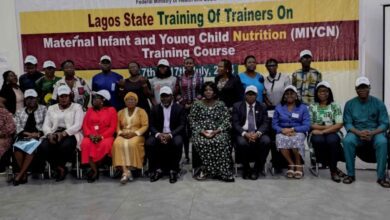Semovita Does Not Contain Plastic Materials Says NAFDAC

In reaction to a viral video showing a woman washing Golden Penny Semovita in a sieve using cold water and getting plastic residue after sieving, the National Agency for Food and Drug Administration and Control (NAFDAC) has said that post-marketing analysis of the product proved otherwise.
Director General (DG) of NAFDAC, Prof. Mojisola Adeyeye made the clarification in a statement issued on Monday, July 3, 2023.
Adeyeye said a similar video was shown in 2020 and upon receiving the alerts from various quarters in the community in 2020, she immediately gave a directive to conduct emergency post-marketing analysis using different brands of Semolina.
“The Agency investigated this claim by conducting appropriate analytical testing in her internationally accredited laboratories.
“The results showed that there was no plastic or any similar harmful contaminants in Golden Penny Semovita. It contained the expected components plus the required Vitamin A”, she said.
The DG further stated that “NAFDAC, therefore wishes to inform the general public that the claim in the social media video assertions is misleading.
“The alleged Golden Penny Semovita is a brand of semolina, a very popular flour made from wheat and consumed in several parts of the world. Semolina contains mainly water, carbohydrates, and about 13% of gluten-forming proteins”.
She also explained that Gluten was made up of two classes of proteins – glutenin and gliadin, which upon addition of water combine to form gluten, a protein that gives nutritive value and imparts other characteristic properties to the product.
Speaking further on the components of Semovita, Adeyeye said, “Glutenin normally gives a bread dough the ability to rise during baking while gliadin gives it the viscous and elastic (viscoelastic) properties, or it simply makes it extensible and elastic.
“This latter property is the rubbery/plastic-like appearance that was exhibited in the said video. Semolina has no plastic content in it; it only exhibits viscous and elastic properties. The rubbery-like material that was observed in the video after many washings with water is the gluten that formed after the gluten-forming proteins get mixed with water”.
The DG maintained that Golden Penny Semovita was manufactured by Flour Mills of Nigeria Plc., a registered company that had been granted marketing authorisation by NAFDAC to manufacture the product and offer it for sale in Nigeria.
In addition, she informed that the company’s operations were certified by NAFDAC after meeting the requirements of Good Manufacturing Practice (GMP) and the relevant Nigerian Industrial Standards (NIS).
NAFDAC therefore, reassured the public that Golden Penny Semovita and indeed all other semolina products registered by the Agency are safe for human consumption having been so approved by the Agency, following science-driven regulatory diligence.
The Agency said there was no cause for apprehension by consumers as such approved products were manufactured in line with Good Manufacturing Practice (GMP) and in compliance with the Nigerian Industrial Standards, which is continuously monitored by NAFDAC.
It further implored members of the public to exercise discretion in the use of social media to address any suspicion they may have on regulated products, as resorting to social media had the tendency to cause fear and panic.
They should rather contact the nearest NAFDAC office for clarification.






